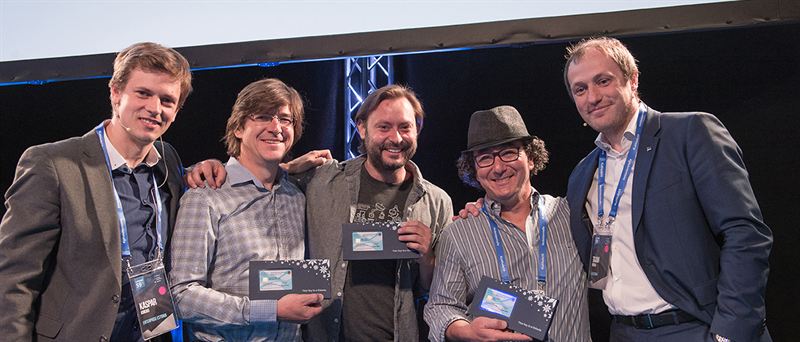Estonia’s e-Residency is reshaping the world

One and a half years ago Silicon Valley entrepreneur Balaji Srinivasan predicted in Wired that thousands of people who manage to find each other on the internet will soon start coming physically together for longer periods of time. “We may begin to see cloud towns, then cloud cities, and ultimately cloud countries materialize out of thin air,” he concluded.
First Country to Offer e-Residency
Estonia recently made a huge step towards this vision by becoming the first country in the world offering e-Residency – a platform of advanced government and business services that is open to virtually everyone on the planet. e-Residency will attract a cloud of business entrepreneurs, freelancers and fans of the digital society around Estonia in a way that can turn the whole idea of being a small country on its head. States can become bigger than the sum of their physical residents. Estonia has already seen hundreds of early birds flocking to sign up for its e-Residency platform although the service itself is still in beta.
So what are the first e-residents really after? Note that people joining e-Residency will not become physical citizens of Estonia, nor would they necessarily reside in Estonia. They will not have tax benefits either. Instead, e-Residency offers access to one of the world’s most advanced set of government and business services that Estonia has developed since the 1990s.
Services and Benefits
e-Residents can create companies in minutes as opposed to days or even months in some regions of the world. They can administer their companies and assets in a hassle-free manner. They can sign documents digitally without travelling. If they need to pay taxes in Estonia, they can take advantage of the world-famous Estonian tax interface that makes declaring taxes so easy that the whole process is over in 5 minutes.
Take Finnish entrepreneur Jorma Tuomainen, who says that he applied for e-Residency as soon as possible because he already had a company in Estonia. “Now e-Residency helps me run my company without constant travel, visiting notaries or printing, signing and scanning stacks of paper,” he says. Tuomainen also believes that people from all over the world who live in unstable countries with dysfunctional business registration systems will be obvious candidates for Estonian e-Residency in the future.
Developments on the Way
The current list of basic services is growing rapidly, but the very success of Estonia’s e-Residency program depends on government and private sector cooperation in creating new applications, pretty fast. Currently several banks and start-ups are working on innovations that will make their services available to e-Residents.
The government of Estonia is open to more developers, service providers and partners to enter the scene. Taavi Kotka, the CIO of Estonia compares the development of the e-Residency platform to many developers working on apps in Apple’s app store. “Estonia is the world leader in e-Residency solutions and thus we have a 1–2 year advantage to attract the first million e-residents and best developers,” says Kotka. He has a bold vision of 10 million Estonian e-residents, but he is also confident that soon some countries may follow with e-Residency programs of their own.
According to Kotka, technology is not the only key to a successful e-Residency programme. He believes that certain values will influence how people will bond digitally with countries. “As to us, we build our e-Residency around Nordic values such as egalitarianism, transparency, accountability and responsibility,” he explains. If Kotka and Srinivasan are right, then in the new digital world of the 2030s, physical states will also become states of mind. •
Photo description: Global investors Michael Jackson, Paul Bragiel and Fadi Bishara (middle) after receiving their Estonian e-Residencies with e-Residency Program Director Kaspar Korjus (left) and the CIO of the Estonian Government Taavi Kotka (right). Photographer: Raigo Pajula.
e-Residents receive a smart ID card which provides:
• Digital identification and authentication
• Digital signing of documents
• Digital verification of document authenticity
• Document encryption
Estonia invites developers to integrate the secure and simple open ID platform for services requiring digital authentication and document signing. e-Residency unleashes the world’s entrepreneurial potential
e-Residents can:
• Establish a company online
• e-administer the company
• Open an Estonian bank account
• Conduct e-banking
• Sign contracts digitally
• Declare taxes online
• Join the e-Residency community
• Applying is easy at: http://e-resident.gov.ee
Additional information:
» investinestonia.com
» e-estonia.com
Teksti: Editori.fi
---
Editori Helsinki - yritysviestinnän asiantuntija
Editori.fi-asiantuntijakanava tuo esille oman alansa asiantuntijat, persoonat ja vaikuttajat www.editori.fi
. Lisätietoa: Valtteri Rantalainen | p. 040 561 7703 | valtteri.rantalainen(a)editorhelsinki.fi I www.editorhelsinki.fi
Avainsanat:


